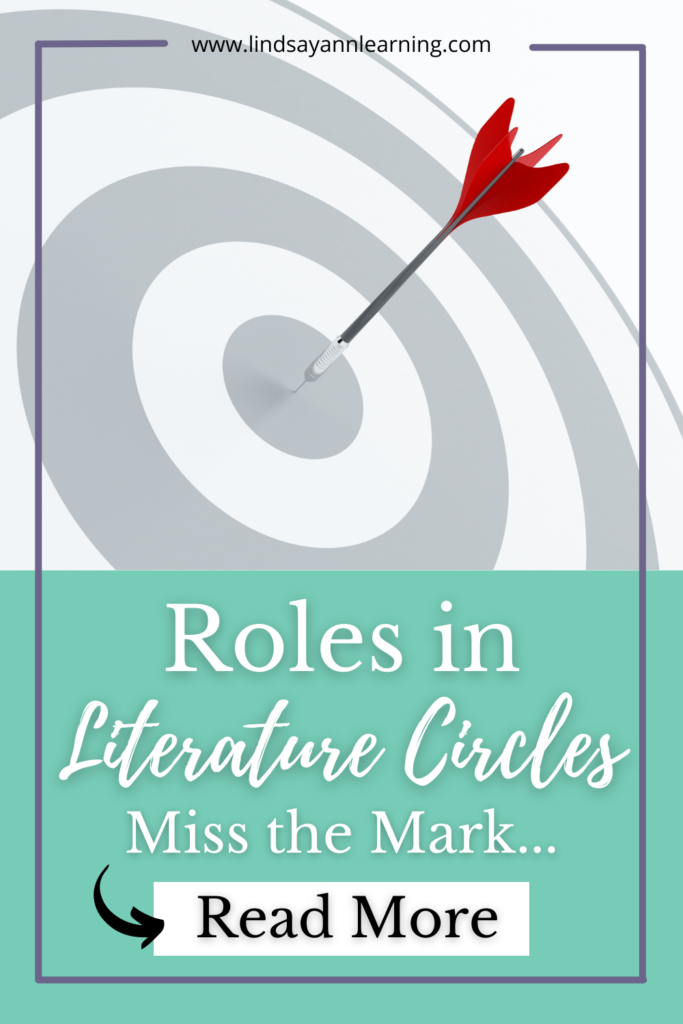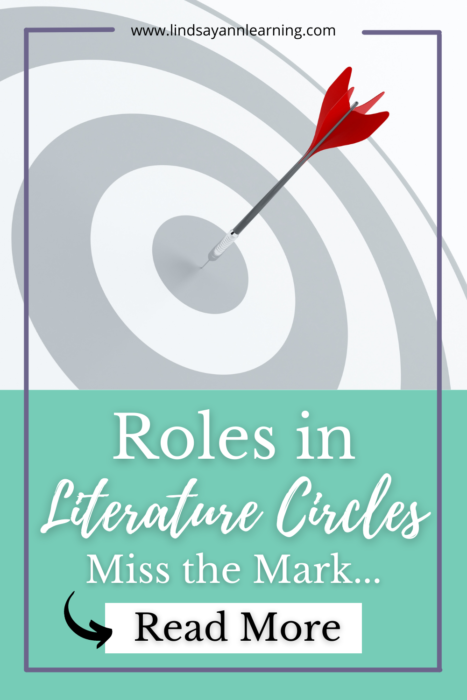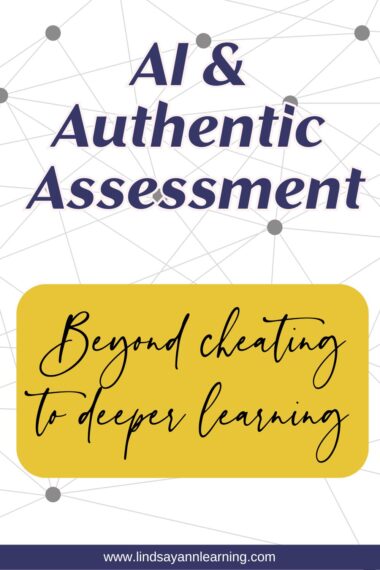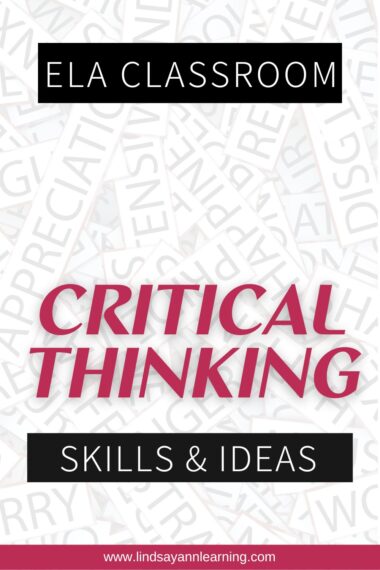Roles in literature circles have been around since I was in school. They’re as dependable as the tears that come at the end of It’s a Wonderful Life and as boring as elevator music.
We give these roles fun names: Question Generator, Word Sleuth, Connector, Quote Finder, etc. They are supposed to keep students on track in lit. circles and give them a sense of engagement.
Yet, in my experience, they always fell short.

First of all, by the time high school rolls around, students have been-there-done-that, gotten the token bumper sticker and selfie shot.
Novelty goes a long way when it comes to student engagement, and role sheets just don’t cut it. As one of my students said, “We’ve been doing the same thing in literature circles since fifth grade.”
And, as my own son complained to me the other night, “Why can’t we just read? Assignments make me hate the book, no matter how good it is.”
So, if variety is the spice of life, why are we serving such bland fare to hungry learners?
Why do we require them to over-process instead of engaging with texts as readers typically do – through dialogical activities?
Shifting Literature Circle Status Quo
This year, I tried something new, and it’s working well so far. In the spirit of sharing, here’s the 411.
My first step was to secure books that my students actually wanted to read.
I enlisted the help of our friendly school librarian for this task. He made an interest-based survey and, based on student responses, selected texts to book talk.
Students then selected their top three titles and we formed reading circles based on their choices.
Even if you don’t have a friendly school librarian who is willing to purchase books for your students, you can pull student-approved titles and host a book tasting or, gasp, allow students to choose a book along with their friends.
Selecting based on interest is the first step. This builds excitement, and it’s important not to kill that excitement with too much “work.” Just read, I tell my students. Or, I have them generate questions for discussion based on what they’re reading to bring to their group.
Nothing heavy. Just light-weight stuff at this point.
Compliance or Engagement in Lit. Circles
But how will I know that students actually read, you may ask.
To that I respond – by the quality of their work and conversation IN the literature circles.
To pursue this further, how do we know students read, anyway, even the ones who fill out a homework sheet? They may skim to complete it, or they may copy from a friend outside of class.
To this end, roles in literature circles don’t automatically mean that everyone will read, nor do they ensure quality conversation.
They do ensure some level of compliance. But I think we can do much better than that.
Treat students like the readers you want them to become.
Ask them about their reading. Give them time to start reading in class. Ask them to complete a “book bingo” for a random prize or choose the “most ______ sentence” from their reading to round robin to the class as a quick check-in.
And, if students hate the book?
Tell them that it’s okay to dislike a book.
Tell them that adults don’t love all of the books they read, even the ones who join real-life book groups.
Tell them that it’s okay to talk about why they didn’t like a book.
And, finally, if the group generally feels a sense of apathy once they start reading, why do we force them to keep reading?
Let them be real-world readers and choose a different title.

Planning for Lit. Circle Success
Part of literature circle success is choosing a group of texts that students will enjoy. If you’re not sure where to start, here are some lists for inspiration:
Growing Up & Finding One’s Self
- Beartown by Fredrik Backman
- Chaos Theory by Nic Stone
- Dumplin’ by Julie Murphy
- Everything, Everything by Nicola Yoon
- I Am the Messenger by Markus Zusak
- Not So Pure and Simple by Lamar Giles
- Paper Towns by John Green
- Stolen by Lucy Christopher
- Firekeeper’s Daughter by Angeline Boulley
- The Great Alone by Kristin Hannah
- The Secret Life of Bees by Sue Monk Kidd
- The Sun is Also a Star by Nicola Yoon
- This Is How it Always Is by Laurie Frankl
- Turtles All the Way Down by John Green
- Where the Crawdads Sing by Delia Owens
Diverse Perspectives in Fiction
- All American Boys by Jason Reynolds
- All My Rage by Sabaa Tahir
- Americanah by Chimamanda Ngozi Adichie
- American Dirt by Jeanine Cummins
- American Street by Ibi Zoboi
- And the Mountains Echoed by Khaled Hosseini
- As Long as the Lemon Trees Grow by Zoulfa Katouh
- A Thousand Splendid Suns by Khaled Hosseini
- Beloved by Toni Morrison
- Boy 21 by Matthew Quick
- Bless Me Ultima by Rudolfo Anaya
- Chaos Theory by Nic Stone
- Children of Blood and Bone by Tomi Adeyemi
- Darius the Great is Not Okay by Adib Khorram
- Dear Martin by Nic Stone
- Every Falling Star by Sungju Lee
- Everything Sad is Untrue by Daniel Nayeri
- How the Garcia Girls Lost Their Accents by Julia Alvarez
- I Am Not Your Perfect Mexican Daughter by Erika Sánchez
- In the Time of Butterflies by Julia Alvarez
- Joy Luck Club by Amy Tan
- Long Way Down by Jason Reynolds
- Love Medicine by Louise Erdrich
- Mad Honey by Jodi Picoult
- Mexican WhiteBoy by Matt de la Peña
- Patron Saints of Nothing by Randy Ribay
- Persepolis by Marjane Satrapi
- The Covenant of Water by Abraham Verghese
- Firekeeper’s Daughter by Angeline Boulley
- The Absolutely True Diary of a Part-Time Indian by Sherman Alexie
- The Girl with the Louding Voice by Abi Daré
- The God of Small Things by Arundhati Roy
- The Hate U Give by Angie Thomas
- The House on Mango Street by Sandra Cisneros
- The Kite Runner by Khaled Hosseini
- The Namesake by Jhumpa Lahiri
- The Poet X by Elizabeth Acevedo
- Things Fall Apart by Chinua Achebe
- They Poured Fire On Us From the Sky by Alephonsion Deng
- We Are Not From Here by Jenny Torres Sanchez
- When Dimple Met Rishi by Sandhya Menon
- With the Fire on High by Elizabeth Acevedo
Nonfiction / Memoir
- 57 Bus by Dashka Slater
- Autobiography of a Face by Lucy Grealy
- Between the World and Me by Ta-Nehisi Coates
- Born a Crime by Trevor Noah
- I Am Malala by Christina Lamb and Malala Yousafzai
- Into the Wild by Jon Krakauer
- Into Thin Air by Jon Krakauer
- Just Mercy by Bryan Stevenson
- Night by Elie Wiesel
- The Color of Water by James McBride
- The Glass Castle by Jeannette Walls
- The Other Wes Moore by Wes Moore
- Tuesdays with Morrie by Mitch Albom
- Unbroken by Laura Hillenbrand
- When Breath Becomes Air by Paul Kalanithi
Classics
- A Tale of Two Cities by Charles Dickens
- As I Lay Dying By William Faulkner
- Beloved by Toni Morrison
- Catcher in the Rye by J.D. Salinger
- Frankenstein by Mary Shelley
- Grapes of Wrath by John Steinbeck
- Great Expectations by Charles Dickens
- Invisible Man by Ralph Ellison
- Lord of the Flies by William Golding
- Metamorphosis by Franz Kafka
- Of Mice and Men by John Steinbeck
- Slaughterhouse-5 by Kurt Vonnegut
- The Bluest Eye by Toni Morrison
- The Great Gatsby by F. Scott Fitzgerald
- The Jungle by Upton Sinclair
- The Scarlet Letter by Nathaniel Hawthorne
- The Things They Carried by Tim O’Brien
- Their Eyes Were Watching God by Zora Neale Hurston
- To Kill a Mockingbird by Harper Lee
- Wuthering Heights by Emily Brontë
Dystopian / Sci Fi Fiction / Fantasy / Magical Realism
- 1984 by George Orwell
- Animal Farm by George Orwell
- Anthem by Ayn Rand
- Blindness by José Saramago
- Brave New World by Aldous Huxley
- Children of Blood and Bone by Tomi Adeyemi
- Fahrenheit 451 by Ray Bradbury
- Feed by M.T. Anderson
- Kindred by Octavia Butler
- Life of Pi by Yann Martel
- Ready Player One by Ernest Cline
- Remarkably Bright Creatures by Shelby Van Pelt
- Scythe by Neal Shusterman
- Station 11 by Emily St. John Mandel
- The Handmaid’s Tale by Margaret Atwood
- The House in the Cerulean Sea by T.J. Klune
- The Maze Runner by James Dashner
- The Road by Cormac McCarthy
- Uglies by Scott Westerfeld
- Unwind by Neal Shusterman
Drama / Epic
- A Midsummer Night’s Dream by Shakespeare
- A Raisin in the Sun by Lorraine Hansberry
- Antigone by Sophocles
- Hamlet by Shakespeare
- Julius Caesar by Shakespeare
- Macbeth by Shakespeare
- Othello by Shakespeare
- The Crucible by Arthur Miller
- The Importance of Being Earnest by Oscar Wilde
- The Odyssey by Homer
Historical Fiction / Philosophy
- A Lesson Before Dying by Ernest J. Gaines
- All the Light We Cannot See by Anthony Doerr
- A Separate Peace by John Knowles
- Poisonwood Bible by Barbara Kingsolver
- Sophie’s World by Jostein Gaardner
- Salt to the Sea by Ruta Sepetys
- The Alchemist by Paulo Coelho
- The Book Thief by Markus Zusak
- The Invention of Wings by Sue Monk Kidd
- The Nickel Boys by Colson Whitehead
- Wolf by Wolf by Ryan Graudin
Mental Health
- Darius the Great is Not Okay by Adib Khorram
- Eleanor Oliphant is Completely Fine by Gail Honeyman
- Flowers for Algernon by Daniel Keyes
- The Curious Incident of the Dog in the Night-Time by Mark Haddon
- The Perks of Being a Wallflower by Stephen Chbosky
- Speak by Laurie Halse Anderson
Short Stories / Essays
- “Civil Disobedience” by Henry David Thoreau
- “Rules of the Game” by Amy Tan
- “Harrison Bergeron” by Kurt Vonnegut
- “I Have a Dream” by Dr. Martin Luther King Jr.
- “Letter From Birmingham Jail” by Dr. Martin Luther King Jr.
- “The Lottery” by Shirley Jackson
- “The Tell Tale Heart” by Edgar Allan Poe
How Do Lit. Circles Work?
Okay, okay, so what’s the secret, then?
Well, it seems simple. Easy. Shift the work so that it happens IN class, IN the literature circles.
Activities-based book groups are working, ya’ll.
Here are some ideas:
- Try hexagonal thinking as a culminating activity. I have over 150 titles already created to save you time, so be sure to check out this blog post for more information!
- Have students create a TikTok or Insta Reel to represent an important theme in the reading and explain it to you.
- Have students complete a hexagonal thinking sort to form connections between details in the text.
- Have students write a ____ word summary of the reading or reduce the reading to a piece of micro fiction
- Have students write a fridge poem (or find a poem) that connects to the reading and explain how details from the texts intersect.
- Have students create a body biography for a character to show how he or she has developed.
- Have students complete a one-pager.
- Have students create a comic strip
- Have students decide on the ____ most important words in the text and use them to create a crib sheet for readers.
- Have students create a top 10 list focused on whatever category you choose.
- Have students discuss the book for a set amount of time and record via Screencastify. Then you could have students watch the discussion and reflect.
- Have students complete a Goosechase based on characters, plot, theme, etc.
- Have students create a GimKit or Quizziz game based on their reading
- Have students discuss via Flipgrid or respond to a prompt.
- Have students conduct research based on something from their reading and explain how it helps them as readers.
- Have students complete a QFT question generation activity.
- Have students participate in a roll-the-dice discussion.
These are just some of the ways that you can switch away from roles in literature circles and start activating students’ curiosity and productivity in class.
As Penny Kittle showed in this video, compliance doesn’t ensure reading. Providing students with choice, community, and engagement is a step in the right direction.
There will always be naysayers or students who don’t read no matter what. But we can’t let them take our focus and attention away from the amazing things that are happening right under our noses.















 Transformative Activities for Media Literacy
Transformative Activities for Media Literacy

[…] book clubs. The single best way to get students to discuss books. I’m not a literacy expert by any means, […]